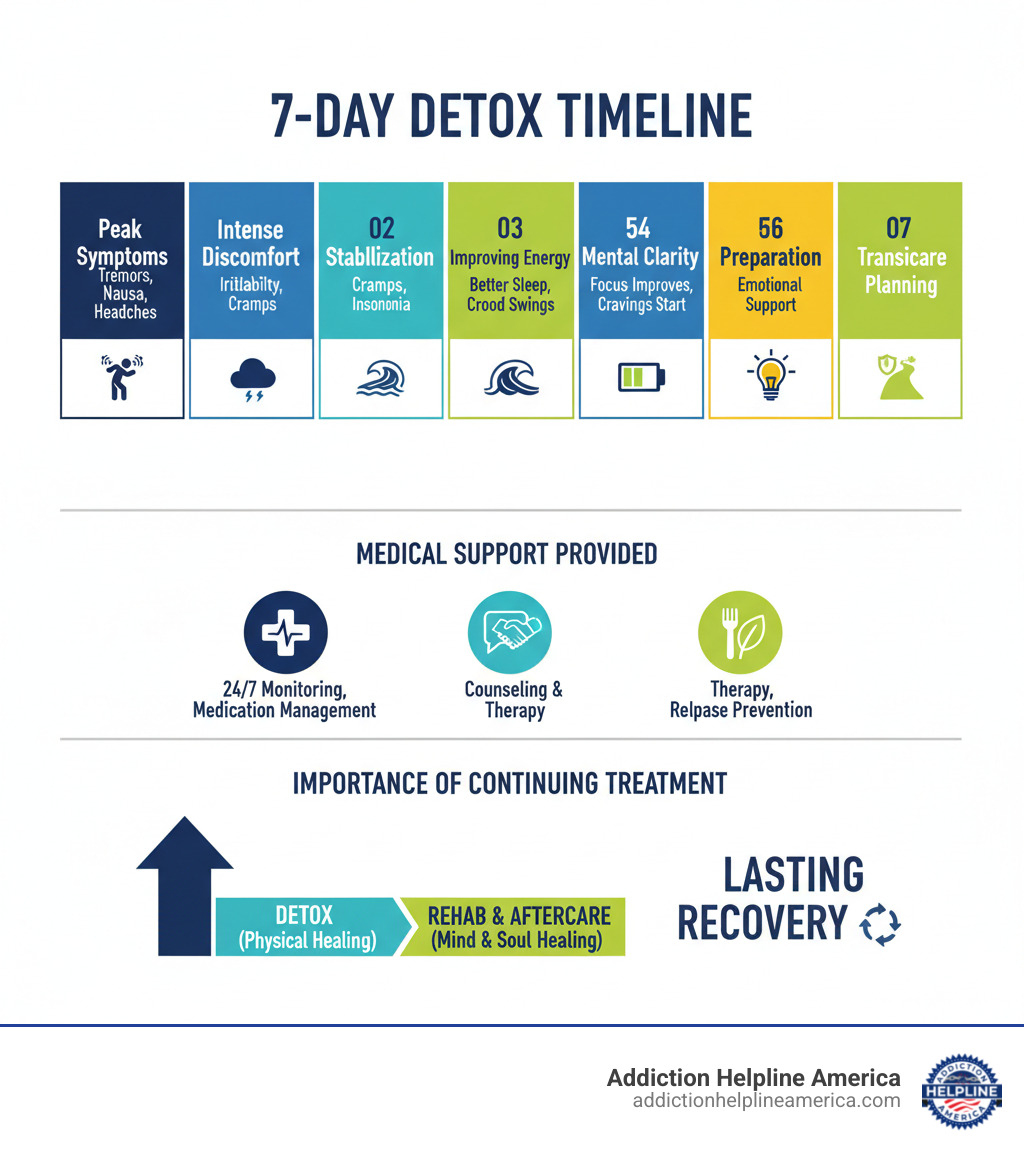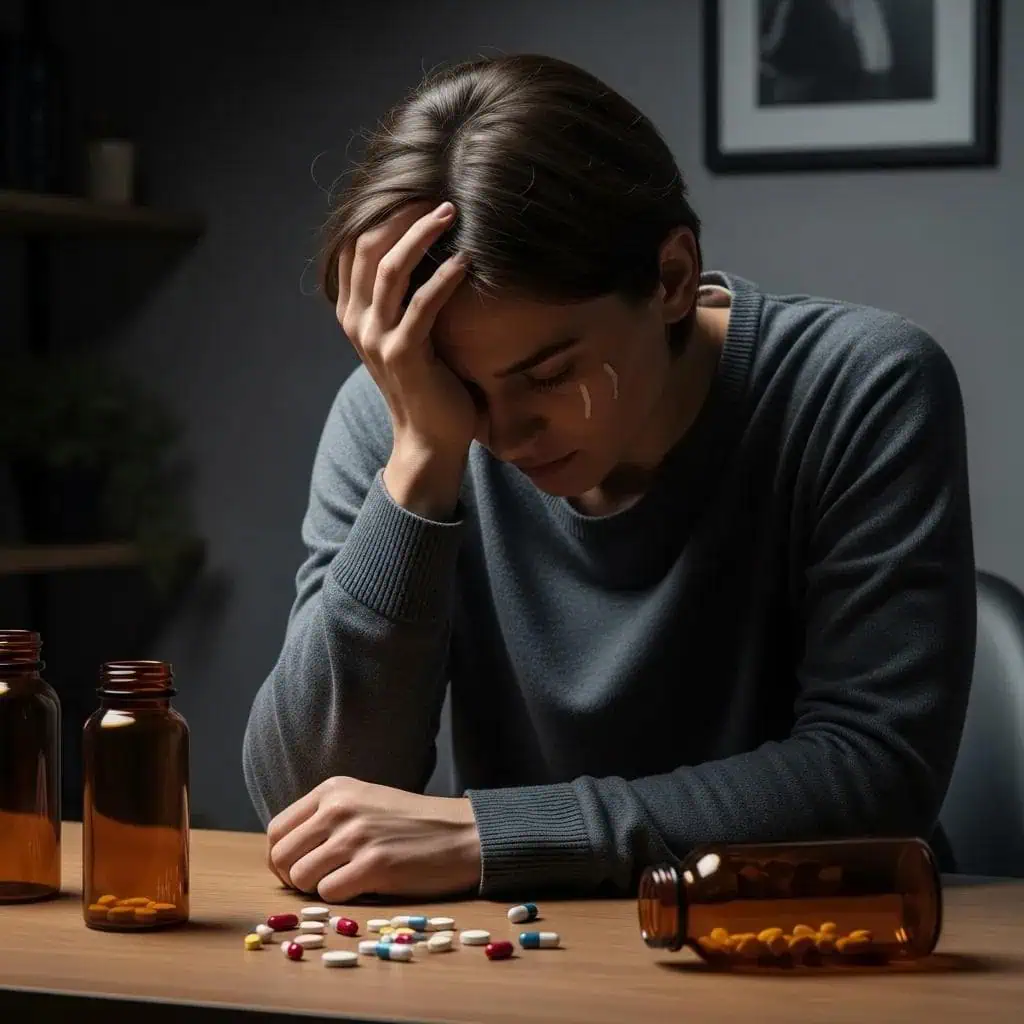
Understanding Your Path to Safe Recovery
A 7 day inpatient detox is a medically supervised program where you stay at a treatment facility for about a week. During this time, your body clears itself of drugs or alcohol while healthcare professionals monitor you around the clock, manage withdrawal symptoms, and prepare you for the next phase of addiction treatment.
Quick Facts About 7-Day Inpatient Detox:
- Duration: Typically 7-9 days of 24/7 medical supervision
- Purpose: Safely manage withdrawal and stabilize your body
- What’s Included: Medical monitoring, medications, nutritional support, and initial counseling
- Best For: Individuals with mild to moderate addiction, first-time treatment seekers, or those with limited time
- Cost Range: Generally $700-$1,000 per day (often covered by insurance)
- Important: Detox is the critical first step, not a full treatment. It must be followed by therapy and ongoing support.
Withdrawal from substances like alcohol, benzodiazepines, and opioids can be dangerous without medical care. Delirium tremens (DTs) from alcohol withdrawal, for example, can be fatal. A 7-day inpatient detox provides the safety net you need during this vulnerable time, especially during the first 48 hours when symptoms often peak. By the end of the week, most people feel physically stable, though cravings may persist.
Detox is not rehab. It addresses physical dependence but not the psychological roots of addiction. Continuing treatment after detox is essential for lasting recovery.
At Addiction Helpline America, we connect individuals and families with quality 7 day inpatient detox programs and aftercare services nationwide. Our team is here to help you steer your options with compassion and clarity.

Key 7 day inpatient detox vocabulary:
What is a 7-Day Inpatient Detox Program?
A 7 day inpatient detox program offers a safe, structured place to begin your recovery. You’ll spend about a week in a specialized facility where medical professionals help your body safely withdraw from drugs or alcohol, keeping you as comfortable as possible.
Think of it as giving your body time to recalibrate. Doing this alone can be dangerous, which is why medical stabilization is key. Nurses and doctors will monitor your vital signs and manage withdrawal symptoms with medication. A major benefit is the supervised environment, which removes you from triggers like people, places, and daily stressors. This focused time allows your body to heal. Many also find comfort in the peer support from others going through similar experiences.
7 day inpatient detox is a foundation, not a cure. It addresses the physical side of addiction, but the deep psychological roots require therapy, counseling, and ongoing support. Detox opens the door to recovery; continued treatment is how you walk through it.

The Goal of a 7-Day Detox
The main purpose of a 7 day inpatient detox is physical cleansing—safely eliminating toxic substances to break the cycle of physical dependence. Without professional help, withdrawal can be life-threatening. Medical professionals manage these symptoms to ensure your safety and comfort.
Detox also prepares you for therapy. It’s nearly impossible to engage in counseling when your body is craving substances and your mind is foggy. Once you’re physically stable, you can focus on the deeper healing work. As the Detoxification and Substance Abuse Treatment guide explains, detox is a critical first step that manages withdrawal while clearing toxins from your body.
Inpatient vs. Outpatient Detox
When choosing a detox, you’ll find inpatient and outpatient options. A 7 day inpatient detox provides 24/7 medical care, so any complications are addressed immediately. The structured environment removes guesswork from your day, while removal from triggers—like stressful situations or access to substances—creates mental space for healing. Many also value the peer support from others in the program.
Outpatient detox allows you to live at home and attend scheduled appointments. It can work for those with mild addiction and a strong support system, but it lacks the intensive monitoring and structure of inpatient care. For more help choosing, see our guide on drug treatment options.
What to Expect During a 7-Day Detox
Walking into a 7 day inpatient detox facility takes courage. Knowing what to expect can help ease any anxiety.
Your journey starts with a comprehensive intake and assessment. The medical team will take your medical history, perform a physical exam, and run lab work. They’ll ask about your substance use history and any co-occurring physical or mental health conditions. This information is used to create a personalized treatment plan just for you.
Once settled, you’ll receive continuous medical monitoring to ensure your safety. Your vital signs will be checked regularly, and medications will be administered to manage withdrawal symptoms. You’ll also begin therapeutic support, often including individual and group counseling sessions. These early interventions plant the seeds for the deeper recovery work to come.

The Typical Withdrawal Timeline and Management
Withdrawal is challenging but manageable with medical support. The experience varies based on the substance used, duration of use, and your overall health. However, a 7 day inpatient detox generally follows this pattern:
Days 1-2: Acute symptoms peak. For alcohol, this can be 24-48 hours after the last drink, with symptoms like anxiety, tremors, nausea, and a racing heart. For opioids, muscle aches and cravings often peak around day 2 or 3. In severe cases of alcohol or benzodiazepine withdrawal, seizures or hallucinations can occur, which is why medical supervision is critical. Learn more about Signs and Symptoms of addiction.
Days 3-5: The stabilization phase begins. The most intense physical symptoms start to ease, though some discomfort may remain. Medications continue to play a key role in keeping you comfortable.
Days 6-7: Noticeable physical improvement. Most people feel much more stable, though some symptoms like irritability or trouble sleeping may linger. You’ll likely engage more in therapy and begin planning for the next steps in your recovery.
Medical Services and Medications
Around-the-clock nursing care is the backbone of a quality 7 day inpatient detox. Your vital signs are monitored continuously to catch and address any issues early.
Medication-Assisted Treatment (MAT) is used to ease symptoms and ensure safety. For alcohol detox, benzodiazepines like diazepam may be used to prevent seizures and manage delirium tremens. For opioid withdrawal, medications like buprenorphine can reduce cravings and discomfort. For details on severe complications, see this Information on severe alcohol withdrawal.
Nutritional support, including IV fluids with vitamins, helps replenish your body. If you have co-occurring mental health conditions like depression or anxiety, the team will address those as well, as integrated treatment offers the best chance at recovery.
Therapeutic and Holistic Support
While medical care is the primary focus of a 7 day inpatient detox, healing your mind and spirit is also important. You’ll likely have individual counseling sessions to begin processing the emotional aspects of addiction. Group therapy offers a powerful connection with others who understand your journey.
Many facilities also incorporate nutritional planning and holistic activities like yoga or meditation. These practices help you manage stress and promote well-being, providing tools you can use long after detox. These early interventions prepare you for the comprehensive treatment that should follow. If you need ongoing mental health support, you can Find a therapist for depression and anxiety through our network.
Is a 7-Day Inpatient Detox Right for You?
Choosing the right detox program is a personal decision based on your addiction severity, life circumstances, and readiness for change. A 7 day inpatient detox is a great fit for many, but it’s not a universal solution. The admissions team at Addiction Helpline America offers free, confidential conversations to help you find what’s right for your unique situation.

Who is a 7-day inpatient detox best suited for?
A 7 day inpatient detox is often ideal for individuals with:
- Mild to moderate substance use, where physical dependence isn’t extremely severe.
- First-time treatment seekers, as a one-week commitment can feel less daunting.
- A strong support system at home to aid in the next phases of recovery.
- An inability to take extended time away from work or family responsibilities.
This shorter timeframe makes treatment accessible when longer programs might seem impossible.
Benefits of a Short-Term Program
The advantages of a 7 day inpatient detox include:
- Quick stabilization in a safe, medically supervised environment where symptoms are managed 24/7.
- Reduced disruption to daily life, making it easier to arrange work or family coverage.
- Intense focus on physical health, with medication and nutritional support to make withdrawal as safe and comfortable as possible.
- A powerful catalyst for long-term change, providing the space and clarity to ignite a new path. If you’re ready, you can Find a Rehab Center Near Me.
Risks and Limitations
It’s critical to understand that a 7 day inpatient detox is not a standalone solution. It addresses the physical aspect of addiction but not the underlying psychological drivers like habits, triggers, and trauma.
The risk of relapse without aftercare is extremely high. Leaving detox without a plan for continued treatment can lead to disappointment. For those with severe, long-term addiction, seven days may be insufficient for full medical stabilization. Trying to rush the process can be risky and ineffective.
Detox gets you through the door of recovery, but continued treatment—like residential rehab or intensive outpatient programs—is what leads to lasting sobriety. Our Relapse Prevention Tips can help you prepare for what comes next.
Navigating Costs, Insurance, and Success
Thinking about the cost of a 7 day inpatient detox can be overwhelming, but it shouldn’t prevent you from getting help. Our team can help you with financial planning, verify your insurance, and clarify what success looks like after detox.

How Much Does a 7-Day Detox Cost?
The cost of a 7 day inpatient detox varies, but generally ranges from $700 to $1,000 per day, totaling $5,000 to $7,000 or more for the week. Factors influencing the price include:
- Facility amenities (e.g., private vs. shared rooms)
- Level of medical care required
- Geographic location
- What’s included in the program (e.g., therapy, aftercare planning)
Fortunately, insurance often covers a significant portion of these costs, so many people don’t pay the full price out of pocket. For a broader overview, see our guide on How Much Does Rehab Cost?.
Using Insurance for Detox
Most major insurance plans now cover addiction treatment, including 7 day inpatient detox programs. Thanks to laws like the Affordable Care Act (ACA), substance use disorder services must be covered similarly to other medical care. This applies to PPO, HMO, and public insurance plans like Medicaid.
Figuring out the specifics of your plan—deductibles, co-pays, and in-network providers—can be tricky. That’s where we come in. Our team specializes in working with insurance companies to verify your benefits and maximize your coverage. We can help you steer the process. For example, you can find specific information on BCBS Insurance Rehab Coverage.
Evaluating the effectiveness of a 7-day inpatient detox
So, does a 7 day inpatient detox work? It is extremely effective at its primary goal: safely guiding you through acute withdrawal, reducing physical dependence, and achieving medical stability. In that sense, it absolutely works.
However, success in recovery is tied to continued treatment. Detox addresses the body, but not the psychological, emotional, and behavioral patterns of addiction. Walking out of detox without a plan for ongoing treatment greatly increases the risk of relapse. Statistics show that individuals who transition from detox into comprehensive treatment are 50-75% more likely to achieve long-term sobriety.
Think of detox as the essential first chapter, not the whole story. It clears the way for the therapeutic work that changes lives. That’s why we help you plan for what comes next, such as exploring Long Term Addiction Rehab Centers.
Life After Detox: Your Next Steps to Lasting Recovery
Completing a 7 day inpatient detox is a major accomplishment. You’ve taken the courageous first step, but the real work of recovery starts now. Detox clears the fog, but the psychological patterns of addiction still need to be addressed. Aftercare planning is your lifeline to maintaining sobriety.

Transitioning to Further Treatment
After your 7 day inpatient detox, transitioning to a comprehensive treatment program is crucial. Options include:
Residential or inpatient rehab: You live at the facility for 21 days or more, participating in intensive therapy to address the root causes of addiction. This structured environment helps you learn coping skills and prepare for life in recovery. Our Inpatient Rehab Tulsa Complete Guide offers a detailed look at this level of care.
Partial Hospitalization Programs (PHP): A step down from residential care, PHPs offer intensive therapy during the day (around 20 hours per week) while you live at home or in a sober living environment.
Intensive Outpatient Programs (IOP): Offering more flexibility, IOPs involve therapy sessions a few days a week for several hours. This allows you to manage work or family duties while still receiving robust support.
Stopping at detox alone significantly increases relapse risk. Ongoing treatment reinforces new habits and addresses the psychological roots of addiction.
Building a Strong Support System
Recovery is not a solo journey. After your 7 day inpatient detox, surrounding yourself with support is essential. Key components include:
Ongoing therapy: Individual and group counseling helps you process emotions, identify triggers, and build a sense of community.
Peer-led support groups: Groups like Alcoholics Anonymous (AA) and Narcotics Anonymous (NA) provide fellowship, structure, and accountability.
Family involvement: Family therapy can heal relationships and create a supportive home environment. Programs like the 12 Step Program Al-Anon offer support for loved ones.
Sober living environments: These structured, drug-free homes provide a bridge between treatment and independent living, offering accountability and peer support.
Staying engaged in the treatment process after detox gives you the best chance at building a fulfilling, substance-free life. At Addiction Helpline America, we help you build a complete recovery plan that fits your unique needs.
Frequently Asked Questions about 7-Day Detox Programs
How severe are withdrawal symptoms during a 7-day detox?
Withdrawal severity during a 7 day inpatient detox varies greatly. It depends on the substance used (alcohol and benzodiazepine withdrawal can be more dangerous), your usage history (duration, amount, frequency), and your overall health. Symptoms can range from mild headaches and anxiety to severe challenges like seizures or hallucinations.
In a medically managed program, you are not alone. Healthcare professionals monitor you 24/7, using medications and supportive care to ensure your safety and comfort. For an overview of symptoms, you can review this alcohol withdrawal syndrome overview.
Is a 7-day detox enough to cure addiction?
No. A 7 day inpatient detox is a critical first step, not a cure. It addresses the physical dependence on a substance by clearing it from your body. However, addiction also involves deep psychological and behavioral patterns that have developed over time. These require ongoing therapeutic treatment to address effectively. Psychological treatment must follow detox for a real chance at lasting recovery.
What happens if I need more than 7 days?
This is completely normal. If your withdrawal symptoms are more severe or complex than expected, the clinical team may recommend extending your stay. This decision is always based on your safety and medical needs. The transition to a longer program, whether in detox or another level of care, is typically seamless. The primary goal is always to achieve medical stability before moving forward. Our Detox Programs Tennessee Complete Guide provides context on different program structures.
Conclusion: Taking the First Step with Confidence
A 7 day inpatient detox program is more than a medical procedure; it’s a doorway to a new life. It provides a safe, supervised environment for your body to heal from physical dependence, creating a stable foundation for the real work ahead.
Detox is just the beginning. It breaks the physical chains of addiction, clearing the fog so you can begin the deeper work of therapy and self-findy. The journey to recovery starts with a single decision: to ask for help.
That’s where Addiction Helpline America comes in. We’ve guided thousands of people through this process, connecting them with quality 7 day inpatient detox programs and comprehensive aftercare. Our guidance is free, confidential, and personalized because we believe everyone deserves a clear path forward.
You don’t have to figure this out alone. You just have to be willing to take that first step. Recovery is not always easy, but it is absolutely worth it. If you’re ready, explore different types of treatment programs to find the path that’s right for you. We’re here to help you move forward with confidence.
7 Day Detox Program: Inpatient Detox and Early Recovery
Detox frequently marks the initial serious step toward recovery for most people, and a 7, day inpatient detox program is the provision of medical stability during that crucial time for many individuals. Such a short, term residential program is about the safe handling of withdrawal while also getting the body and mind ready for further treatment.
What Happens During a 7 Day Inpatient Detox
The 7 day detox program is a plan to help the patients through the most severe withdrawal stage. It is a time when the patients are under close medical supervision even though they have to endure the withdrawal at the hospital.
Typical components include:
- Continuous health monitoring
- Management of withdrawal symptoms
- Emotional support during early stabilization
- Structured daily routines
The medical teams make changes in treatment according to the patient’s body as the period of withdrawal is different for each person.
Our helpline is 100%
free & confidential
If you or someone you care about is struggling with drug or alcohol addiction, we can help you explore your recovery options. Don’t face this challenge alone—seek support from us.
Programs
Resources
Will my insurance
cover addiction
treatment?
We're ready to help
Find the best
drug or alcohol treatment
center
Are you or a loved one struggling with addiction? Call today to speak to a treatment expert.












